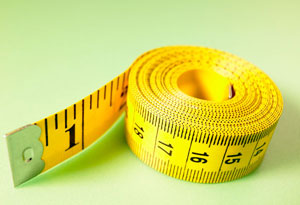I'm Not Overweight, I'm the Right Weight: How to Dress With Confidence

Photo: Thinkstock
Ronna Lichtenberg knows that her weight—whether up or down—determines how she's perceived. But she's figured out how to finesse that crucial moment of assessment.
Over the course of my work life, I've been a lot of different sizes. There was my week-before-my-wedding size, which was my lowest adult weight and close to my fantasy of being thin enough. There was my year-after-thyroid-surgery size, which was my heaviest. And there were all the years in between, when I bounced up and down the scale.
Having been so many sizes, I know that the world, including the world of work, treats me differently depending what I weigh. It seems unfair and stupid: I'm the same person in a size 6 blazer as I am in a 14. But the truth is that we all make quick judgments based on looks. I do it. You do it, too. We notice whether or not the other person fits our expectations. If you were to meet me, I would probably sense, in that initial moment of assessment, that you don't think I'm the "right" weight.
I've struggled with that moment for years. It's a moment that matters, especially in the workplace. Heavy women earn less, according to extensive research compiled by Mark Roehling, Ph.D., an assistant professor of management at Western Michigan University. One study revealed that mildly obese white women are paid 6 percent less than their thinner counterparts, while highly obese white women earn 24 percent less. (Black women suffer, too, but to a lesser extent.) The unspoken assumption, I believe, is that if you are fat, you are lazy and undisciplined. Not a player.
One of my worst moments was my first meeting with someone I'll call Brett, a potential client for my consulting business. Brett works on Manhattan's Upper East Side, where a size 10 is a plus size. I introduced myself; he did a double take. "Oh," he stammered, "I thought you would be [long pause] tiny." It took quite a while for both of us to recover.
Since then I've learned a lot about how not to handle being sized up: showing that you feel put down; offering long explanations for why you are currently this weight and not another; getting in the other person's face ("Why do you care what I weigh?"); praising her lavishly at your own expense ("You look so incredible in those size 2 python pants that I couldn't even pull up over my knees...").
In the long run the real battle is to be totally comfortable with yourself. But that's a long run, and I've had to find a way to cope while I struggle along the path to self-acceptance. I've figured out a plan that works for me and could help you, too. Part one is to accept that there will be a moment of assessment, but it will be only a moment—okay, ten minutes, tops. Part two is to prepare so well for that assessment that it works for you instead of against you.
The truth is that your weight is not the real issue. The issue is that the person appraising you has a legitimate need to know whether you are confident and capable—someone she wants to have on her side.
Since you are all of those things, if she has half a brain she will figure it out over time. Your goal is to help her figure it out in the least amount of time possible. That brings us to part two—preparation and careful attention to the way you present yourself. I've learned to wear clothes the size I am, not the one I hope to be after a few weeks on Slim-Fast. The better your clothes fit, the more it looks like you intend to be exactly this size, which dispels doubts about whether or not you are confident and capable. And if you wear beautiful lingerie, you'll carry yourself more like a queen and less like a worker bee. Great posture telegraphs inner strength.
The right accessories are also powerful cues. I still cherish an expensive leather bag that all by itself has landed me clients I doubt I'd have gotten otherwise. Shoes can speak volumes, as can a great watch. Look for accessories you love but think are too good for you: Those are the pieces that will say what needs to be said.
Preparing for the moment lessens the chance you will be distracted or hurt by what happens in the moment and frees you for the possibility of true connection.
As for Brett? Even though our initial meeting was clumsy and difficult, we survived it and have done a few terrific projects together. Yesterday we ran into each other in the gym. It was 6:30 A.M.; I was beet red and sweaty. Before launching into a discussion about our new project, he looked at me, smiled, and said, "Ronna, you look great." I felt it, too.
Corporate consultant Ronna Lichtenberg is the author of It's Not Business, It's Personal (Hyperion).
Dealing with a few extra pounds? Keep reading:



